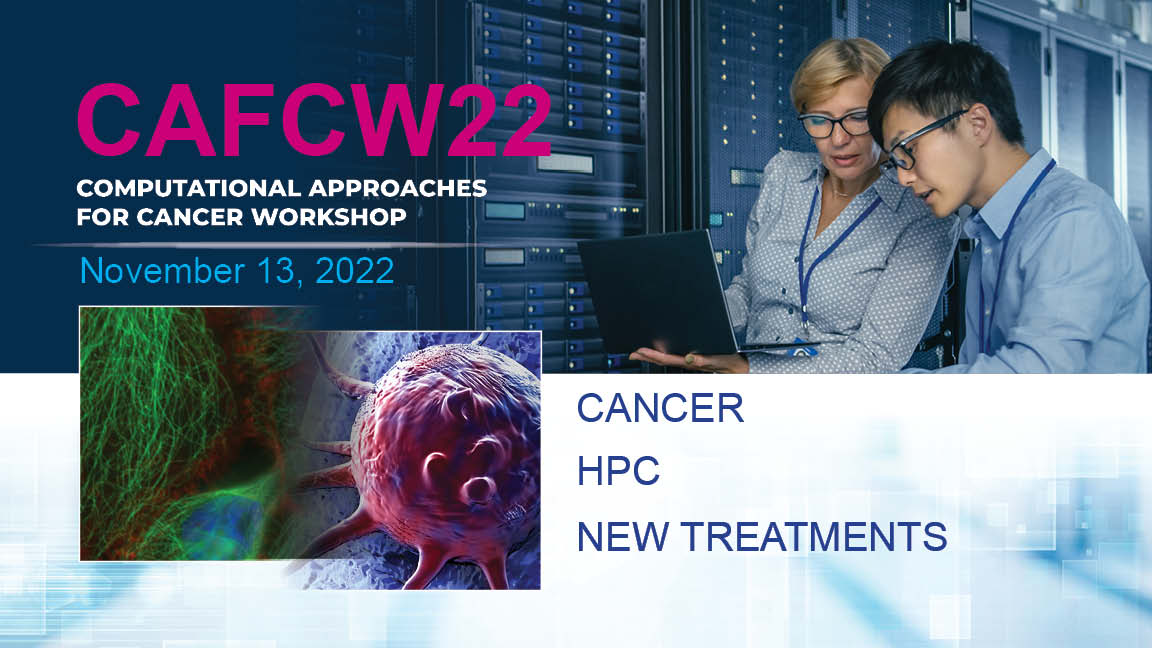Eighth Computational Approaches for Cancer Workshop (CAFCW22)
Held in conjunction with SC22:
The International Conference on High Performance Computing, Networking, Storage and Analysis
Location and Timing
Dallas, Texas, USA
November 13, 2022
8:30 a.m. - 12 noon, CST
Key events and dates
Key Events |
Dates |
| Abstract Submission Deadline | August 16, 2022 (Extended) |
| Notification of Acceptance | September 16, 2022 |
| Workshop | November 13, 2022 |
Call for Abstracts: https://ncihub.org/groups/cafcw/cafcw22/call_for_abstracts
Program and Schedule: https://ncihub.org/groups/cafcw/cafcw22/cafcw22_program
Workshop Overview
New computational opportunities and challenges have emerged within the cancer research and clinical application areas as the size, source, and complexity of cancer datasets have grown. Simultaneously, advances in computational capabilities, with exceptional growth in AI and deep learning, are reaching unprecedented scales. A special emphasis for the 2022 workshop is efforts and computational approaches for HPC to accelerate new treatments. Such efforts span many key areas in cancer including drug discovery, precision radiation oncology, virtual clinical trials, and AI to deliver precision cancer treatments.
This Eighth Computational Approaches for Cancer Workshop 2022 (CAFCW22) will bring together a wide-range of individuals including clinicians, cancer biologists, mathematicians, data scientists, computational scientists, engineers, developers, vendors, thought leaders and others with an interest in advancing the use of computation to better understand, diagnose, treat and prevent cancer. As an interdisciplinary workshop, the sharing of insight and challenges fosters collaborations and future innovations accelerating progress in computationally and data-driven cancer research and clinical applications.
The importance of high performance computing is ever increasing as a critical component of cancer research and clinical applications. The current global cancer ecosystem including new scientific methods, AI, ever expanding sources of data, and use of simulations have set the stage for tremendous growth in HPC with the new US Cancer Moonshot 2.0, which aims to reduce mortality of cancer by 50% in 25 years. Originally established as part of SC during the advent of the Precision Medicine and the US National Strategic Computing Initiative, this workshop continues to provide a key venue for all disciplines and interests to converge, share insights, and develop collaborations where HPC and computational approaches will advance the frontiers of cancer research and cancer care.
Over the past eight years, the CAFCW has brought together cancer researchers and advanced computing scientists to share ideas and challenges, establish collaborations and identify common needs.
Call for Abstracts: https://ncihub.org/groups/cafcw/cafcw22/call_for_abstracts
Student Track
Beginning last year, CAFCW expanded its reach by adding a focus on workforce development. As a part of this, we will again this year be honoring students who may not traditionally attend the workshop (such as undergraduates and students from non-technical degrees) who submit accepted research. They will have a highlighted presentation, opportunities to engage with the Students@SC program, special programing focused on training and workforce development, and further awards to be announced. Students can submit their abstracts at Student Submission Form.
CAFCW22 Organizing Committee:
Eric Stahlberg, PhD, Frederick National Laboratory for Cancer Research
Sean Hanlon, PhD, National Cancer InstituteSally Ellingson, PhD, University of Kentucky
Patricia Kovatch, Icahn School of Medicine, Mount Sinai
Lynn Borkon, Frederick National Laboratory for Cancer Research
Petrina Hollingsworth, Frederick National Laboratory for Cancer Research
CAFCW22 Program Committee:
Boris Aguilar, PhD, Institute for Systems Biology
Orly Alter, PhD, University of Utah
Jane Bai, PhD, Food and Drug Administration
Kristy Brock, PhD, MD Anderson
Jeff Buchsbaum, MD, PhD, National Cancer Institute
Hsun-Hsien Shane Chang, PhD, Novartis
Caroline Chung, MD, MD Anderson
Michael Difilippantonio, PhD, National Cancer Institute
Keyvan Farahani, PhD, National Cancer Institute
James Glazier, PhD, Indiana University
Emily Greenspan, PhD, National Cancer Institute
Ryuji Hamamoto, PhD, RIKEN Center for Advanced Intelligence Project
Christopher Hartshorn, PhD, National Cancer Institute
David Hormuth, PhD, University of Texas at Austin
Florence Hudson, Northeast Big Data Innovation Hub at Columbia University in the City of New York
Ai Kagawa, PhD, Brookhaven National Laboratory
Ho-Joon Lee, PhD, Yale University
Ernesto Lima, PhD, University of Texas at Austin
Amanda Paulson, PhD, University of California, San Francisco
Thomas Radman, PhD, National Institutes of Health
Katarzyna (Kasia) Rejniak, PhD, Moffitt Cancer Center
Russell Rockne, PhD, City of Hope
Gundolf Schenk, PhD, University of California, San Francisco
Ilya Shmulevich, PhD, Institute for Systems Biology
Amber Simpson, PhD, Queen's University
Thomas Steinke, PhD, Zuse Institute Berlin
Kristin Swanson, PhD, Mayo Arizona
Gina Tourassi, PhD, Oak Ridge National Laboratory
Thomas Yankeelov, PhD, University of Texas at Austin
George Zaki, PhD, Frederick National Laboratory
Questions? Contact cafcw@nih.gov


